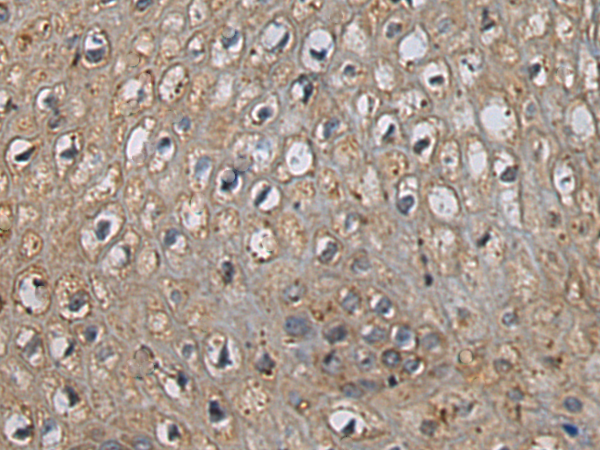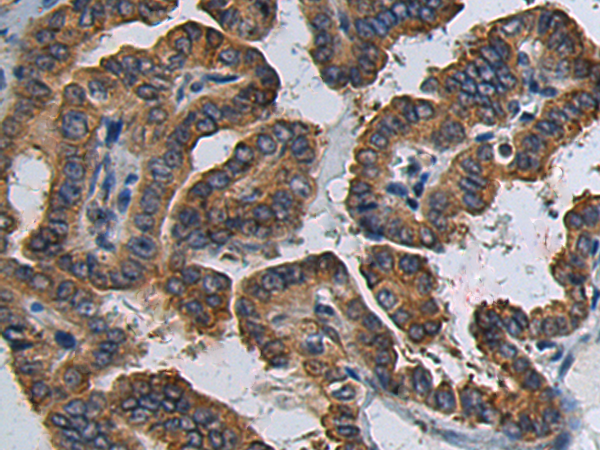

| WB | 咨询技术 | Human,Mouse,Rat |
| IF | 咨询技术 | Human,Mouse,Rat |
| IHC | 1/100-1/300 | Human,Mouse,Rat |
| ICC | 技术咨询 | Human,Mouse,Rat |
| FCM | 咨询技术 | Human,Mouse,Rat |
| Elisa | 1/5000-1/10000 | Human,Mouse,Rat |
| Aliases | CIS; G18; SOCS; CIS-1; BACTS2 |
| Host/Isotype | Rabbit IgG |
| Antibody Type | Primary antibody |
| Storage | Store at 4°C short term. Aliquot and store at -20°C long term. Avoid freeze/thaw cycles. |
| Species Reactivity | Human, Mouse, Rat |
| Immunogen | Fusion protein of human CISH |
| Formulation | Purified antibody in PBS with 0.05% sodium azide and 50% glycerol. |
+ +
以下是关于CISH抗体的3篇代表性文献,涵盖其应用及功能研究:
---
1. **文献名称**:*CISH regulates immune checkpoint receptor signaling in T-cell exhaustion*
**作者**:Palmer DC, et al.
**摘要**:该研究通过CISH抗体检测发现,CISH蛋白在慢性病毒感染和肿瘤微环境中的T细胞中高表达,通过抑制IL-2信号通路促进T细胞耗竭,靶向CISH可能增强免疫治疗疗效。
---
2. **文献名称**:*CISH expression is associated with poor prognosis in hepatocellular carcinoma*
**作者**:Zhu Y, et al.
**摘要**:利用CISH抗体进行免疫组化分析肝癌组织,发现CISH高表达与肿瘤侵袭性、转移及患者生存率下降相关,提示其可作为肝癌预后标志物。
---
3. **文献名称**:*CISH antibody validation for flow cytometry in human peripheral blood mononuclear cells*
**作者**:Smith JL, et al.
**摘要**:研究系统验证了CISH抗体在流式细胞术中的特异性,确认其在人外周血单核细胞中的检测可靠性,为CISH在免疫细胞功能研究中的应用提供技术依据。
---
如需更多文献或具体研究领域,可进一步补充关键词细化检索。
The cytokine-inducible SH2-containing (CISH) protein is a member of the suppressor of cytokine signaling (SOCS) family, which regulates intracellular signaling pathways, particularly the JAK-STAT pathway. Discovered in the late 1990s, CISH is induced by cytokines such as IL-2. IL-3. and erythropoietin, and functions as a negative feedback regulator to attenuate cytokine signaling. It contains a central SH2 domain that binds phosphorylated tyrosine residues on cytokine receptors or JAK kinases, targeting them for proteasomal degradation or blocking downstream signal transduction.
CISH plays critical roles in immune homeostasis, hematopoiesis, and cellular stress responses. Dysregulation of CISH has been linked to various diseases, including cancers (e.g., breast, gastric), autoimmune disorders, and infectious diseases. Notably, genetic polymorphisms in CISH are associated with susceptibility to tuberculosis and malaria, highlighting its importance in pathogen defense.
CISH antibodies are essential tools for studying its expression, localization, and interactions in both physiological and pathological contexts. They are widely used in techniques like Western blotting, immunohistochemistry, and co-immunoprecipitation. Recent research explores CISH as a potential therapeutic target or biomarker, particularly in immunotherapy-resistant cancers where its overexpression may contribute to T-cell exhaustion. However, its dual role as both tumor suppressor and promoter in different contexts requires further investigation.
×